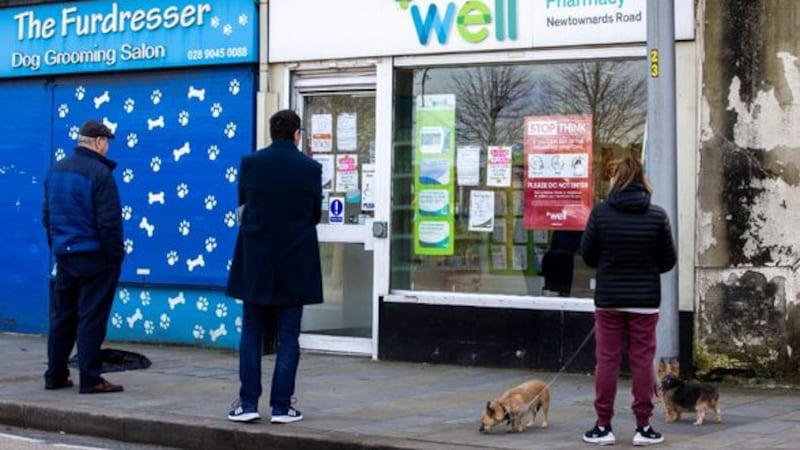You can go out but can you go to the great outdoors? Closure of parks, forests, beaches and mountains remains a point of confusion in Northern Ireland and the Republic. First Minister Arlene Foster and Taoiseach Leo Varadkar have both urged people to get into the wild for their daily exercise, yet local authorities are closing amenities everywhere as soon as this advice is heeded. The National Trust, the Northern Ireland Forestry Service and Wicklow County Council are among the organisations to have initially encouraged extra visitors only to change their minds due to concerns over social distancing.
The problem, which really should have been obvious, is that most outdoor trips involve driving to a small car park, walking along a narrow path, then turning around and walking back to the car park. It does not take too many people to do this before you might as well be in town on a Saturday afternoon.
**
UUP health minister Robin Swann has received a solicitor’s letter from a group of nurses seeking assurances on personal protection equipment. Only staff working in coronavirus areas of hospitals or treating patients who have tested positive are receiving protective gear, which is clearly hopeless for an infection that takes two weeks to show symptoms, if it shows them at all.
A paper published this week by Italian doctors at the centre of the epidemic finds hospitals are “highly contaminated” and “might be the main Covid-19 carriers”.
Coronavirus is not something you either catch or do not catch. Like a poisoning, the amount of viral material you come into contact with strongly determines how sick you might become. Nobody is more exposed than hospital staff, as their illness rate in Italy has shown.
This is also why reports of frontline workers being maliciously coughed upon are taken so seriously. A cough can expel tens of thousands of viruses, compared to perhaps a few hundred picked up from touching an infected surface.
**
Sinn Féin and the DUP have played down coronavirus contingency plans to deploy UK service personnel in Northern Ireland, with both parties saying they do not believe this is currently necessary. What happens if it is necessary? UUP health minister Robin Swann showed how to permanently defuse the argument by saying he would welcome troops from the Republic as well.
In reality, most plans envisage only a few hundred UK personnel being used here, mainly for driving emergency vehicles and delivering medical supplies. The main scenario for uniformed soldiers on the streets involves them guarding hospitals, by which point political sensitivities would be irrelevant.
**
Perhaps the army can help Belfast City Council, which has ceased collecting food waste bins due to coronavirus staffing and safety issues. It has also closed all its recycling centres.
General waste bins will continue to be collected once a fortnight but the council is not advising people to use these instead. It says food waste bins should continue to be filled as normal on the off-chance they might be collected.
That means food will inevitably rot outside thousands of homes for months. Uncollected organic domestic waste can be a real hazard, breeding bacteria and viruses that are then spread by rats and flies. Associated infections for householders and waste handlers include salmonella, gastroenteritis and staphylococcus, the latter of which can lead to pneumonia.
This seems like something to be avoided during a public health emergency.
**
The government has officially ditched the 2018 Westminster boundary review, which would have cut the number of constituencies from 650 to 600, including one lost in Northern Ireland (and presumed lost to unionism).
The project was long known to be doomed - turkeys do not vote for Christmas. That issue will now be solved by no longer requiring Parliament to approve changes. The next review, due in 2026, will automatically implement the proposals of the independent boundary commissions around the UK.
That should give Sinn Féin even more of a reason to participate in boundary commission consultation exercises, which it bizarrely failed to do in 2018, although it still complained about the outcome.
The DUP also disliked some of the commission’s proposals, leading MP Ian Paisley jnr to utter the infamous line “we’ll see about that”.
That warning was based on Westminster leverage that would now be useless even if the DUP still had it.
**
The Anholt Ipsos Nation Brands Index is an annual survey of international attitudes to 50 countries, focusing on six aspects of their ‘brand’. Questions are asked separately about Northern Ireland and Scotland, as well as the UK as a whole. Results from 2019 are out and Stormont’s executive office has issued a celebratory statement, welcoming our respectable mid-ranking place in all six categories.
It does seem a little odd that Northern Ireland’s highest score, at 20th place, is for “governance”, given that in 2019 we had been without a government for three years.
It seems even odder that our government would boast about it.









